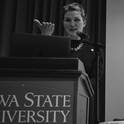Juan Pablo Duarte, revered as a founding father of the Dominican Republic,2 recently found his nationalist message featured in a video on YouTube titled “ex Dominican@ os que juraron por la bandera de Haiti,” or “ex-Dominicans who swore on Haiti’s flag.” The short clip, about seven minutes in total, features a slideshow containing photos and names of Dominicans who, according to the nationalist, anti-Haitian producers of the video, have “betrayed their Dominican citizenship,” as the title slide suggests, and sworn allegiance to Haiti.3 What sparked the production of this video? The answer is muddled by centuries of negrophobia and anti-Haitianism in the Dominican Republic; beginning with colonization; early border disputes; occupation in the nineteenth century; and Rafael Trujillo’s thirty-one-year reign (1930–1961). The Dominican Republic’s notorious dictator is responsible for the institutionalization of anti-Haitian ideology and it is during this time that the ideology entered the Dominican school curriculum, serving as only one example of the policy’s firm grip on Dominican society. Trujillo’s plan for the nation, based on Eurocentric and Catholic values, did not end with his assassination, but found a new place within Dominican intellectual thought of the late twentieth century. The dictator’s right-hand man, Joaquín Balaguer, in his 1947 publication, retitled in 1983 La isla al revés, equated Haitians to backwardness and labeled them as savages, deeming the Haitian nationals threats to the “non-black” Dominican nation. Although the conjunctures of the political, economic, social, and cultural destinies of the two sister-countries, Haiti and the Dominican Republic, are marked by a long list of misunderstandings, disputes and crises, for the purpose of this paper I will primarily consider two influential events involving Dominican-Haitian relations: the Haitian Massacre of 1937 and the Tribunal Court Ruling (0168–13) of September 2013.
Available at: http://works.bepress.com/megan-myers/1/

This is an article from Confluencia 32 (2016): 168, doi:10.1353/cnf.2016.0040. Posted with permission.